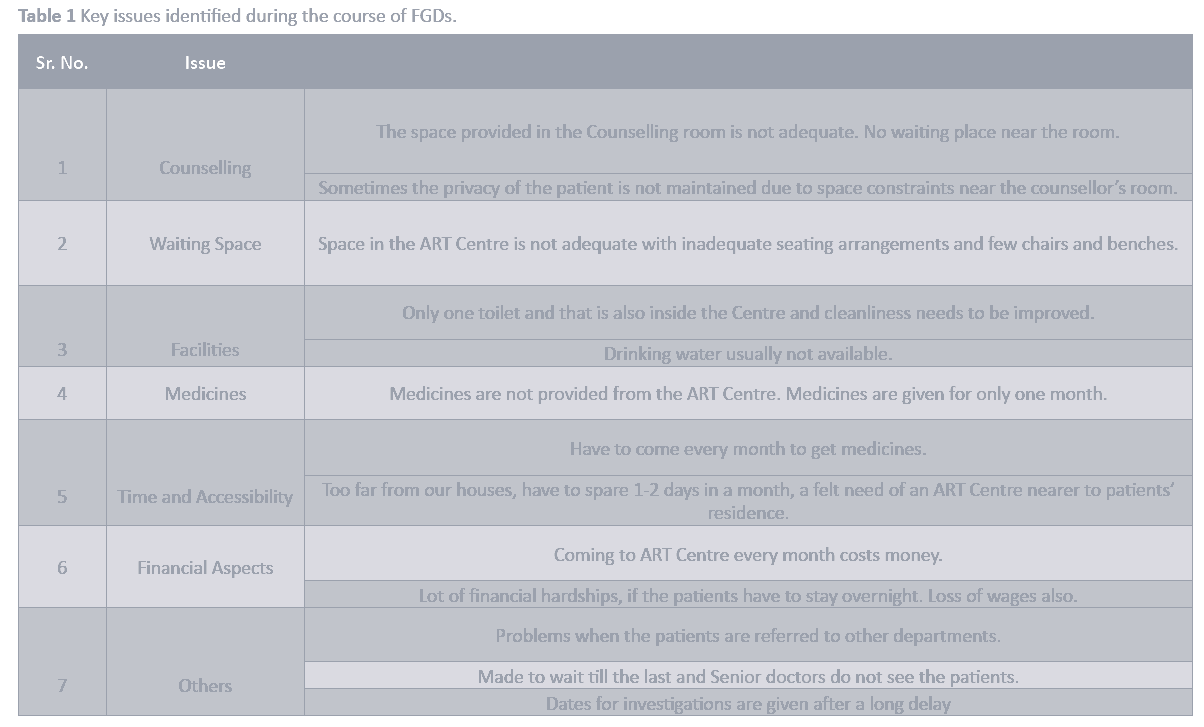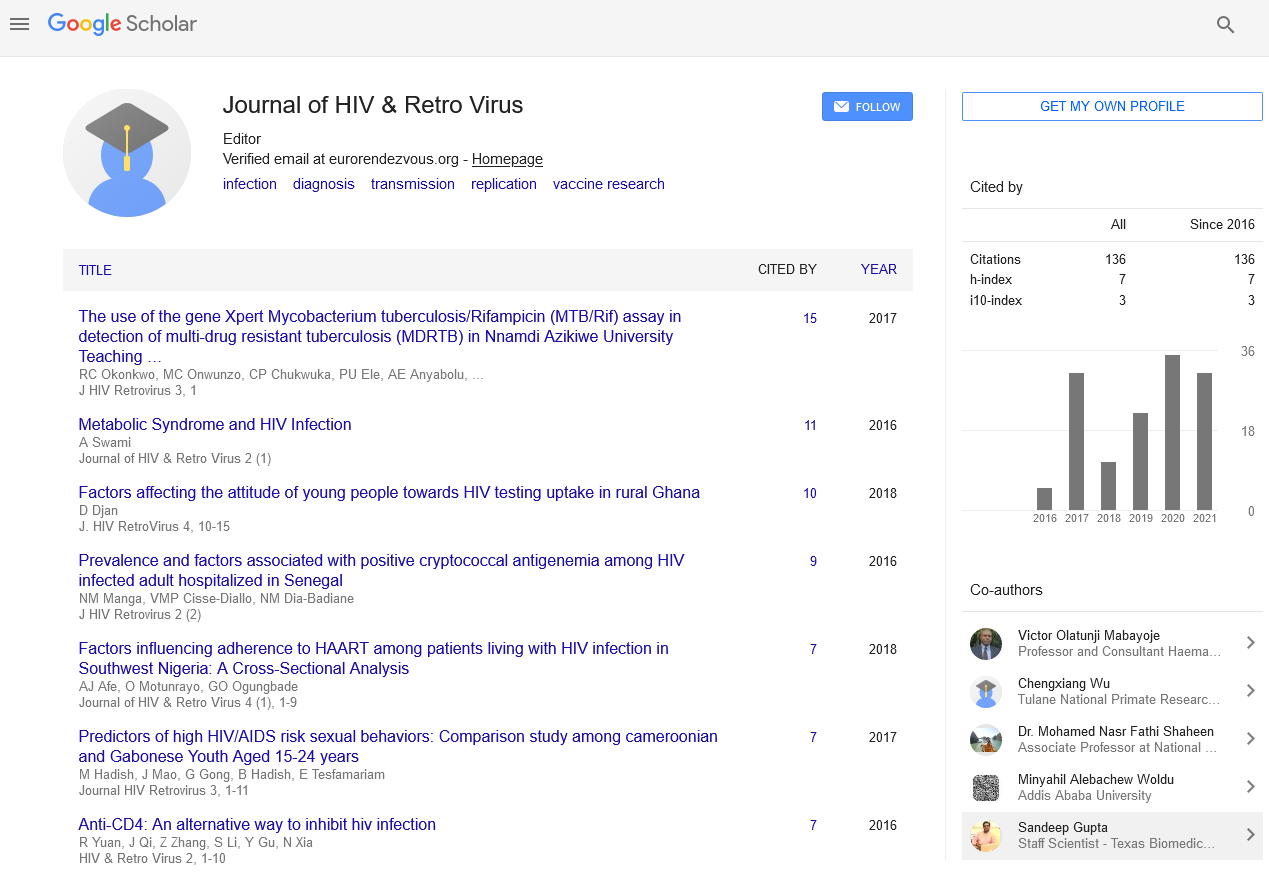Abhilash Sood1, Seema Rani2, SR Mazta3, Ashok Sharma3, AK Bhardwaj1, SK Raina1*,Godhavari Verma4
1Dr. R.P. Government Medical College Tanda, Himachal Pradesh
2Himachal Pradesh Health Services, Himachal Pradesh
3Indira Gandhi Medical College, Shimla, Himachal Pradesh
4ART centre, IGMC Shimla, Himachal Pradesh
- Corresponding Author:
- SK Raina
Associate Professor
Department of Community Medicine
DR. RPGMC, Tanda, Himachal Pradesh, India
Tel: 09418061066
Fax: 01892-267115
E-mail: ojasrainasunil@yahoo.co.in
Received date: September 12, 2015, Accepted date: Janaury 25, 2016, Published date: February 01, 2016
Citation: Sood A, Rani S, Mazta SR, et al. A Focus Group Discussion (FGD) Based Study to Understand the Patient Perspectives of Health Care Along with the Satisfaction to Services Among the Adult HIV/AIDS Patients. J HIV Retrovirus. 2016, 2:1.
Keywords
HIV/AIDS; Focus group discussion; Patient satisfaction
Introduction
Human Immunodeficiency Virus (HIV) infection in India was first detected in Madras in 1986. Subsequent countrywide surveillance has shown its widespread prevalence throughout the country. There are various zones in the country with varying prevalence rates. Himachal Pradesh, including the whole of North India is considered a low prevalence and low knowledge setting for HIV/AIDS [1].
The needs and level of satisfaction of patients is of immense epidemiological importance and more so in HIV / AIDS patients [2]. Identifying and understanding their needs and difficulties helps in reducing episodes of non adherence and improving the services provided. Quantitative methods of research are unable to provide data on the needs and beliefs of patients. Qualitative methods, on the other hand, provide real life views of the people. Focus Group Discussions (FGDs) can be used to explore people’s needs, expectations, behaviour and barriers to health care services [3]. Hence the authors used Focus Group Discussions (FGDs) to achieve the study objectives.
The present study was undertaken with an aim to understand the patient perspectives of health care along with the satisfaction to services among the adult HIV/AIDS patients attending the Antiretroviral Therapy (ART) centre at Indira Gandhi Medical College (IGMC) Shimla, HP from November 2008 through May 2009.
Materials and Method
The present study was conducted at the ART centre of the Department of Medicine, IGMC Shimla amongst HIV positive adult patients on antiretroviral therapy visiting the ART centre, IGMC Shimla in the state of Himachal Pradesh, India. Written informed consent was taken from the patients before enrolling them in the study. The study was also approved by the ethics committee of IGMC Shimla.
Study design
A qualitative study was carried out from November 2008 to May 2009 at the ART center, IGMC Shimla.
Method
The patients consenting to be enrolled in the study were invited to attend FGDs. A total of 11 FGDs were conducted in which 104 patients took part. Each FGD had 7 to 10 participants. An interviewer guide was prepared before conducting the FGDs. This guide was prepared in the local vernacular language, with the help of counsellor posted in the ART Centre. The guide had questions related to patients’ experiences in the ART Centre and their perspectives on health problems and health seeking behaviour. This guide was also pre tested on 10 indoor patients at IGMC Shimla. Questions were appropriately modified based on the responses of the test subjects. Patients enrolled in the pre testing of the guide were not enrolled in the study. FGDs were carried out at the ART centre before the clinic timings. Each FGD lasted around one hour. At the end of the FGD, a summary of the discussion was made and presented to the study participants. Corrections and clarifications were accordingly made to the summary.
The author was the moderator in the FGDs conducted, while the counsellor posted at the ART centre was the note taker. Sociograms were also prepared for the FGDs. Topics discussed in the FGDs were those pertaining to the experience of the patients at the ART centre. The order in which topics were discussed was flexible, starting from the general issues and gradually flowing into more specific ones. The participants were assured of maintaining confidentiality.
Results
A total of 11 FGDs were conducted in which 104 participants took part. Out of these, 55 were males and 49 females. The mean age of the study participants was 33.7 ± 6 years. Among the males, majority were drivers by occupation while females were mostly housewives.
Key issues identified during the course of the FGDs are shown in Table 1. All the patients were satisfied with the counselling services provided to them at the ART centre. However, 72% of the patients were of the opinion that the space provided for counselling is not adequate. Another 40% of the patients said that sometimes their privacy is not maintained due to these space constraints.
Table 1: Key issues identified during the course of FGDs.
Financial aspects of care were of major concern to all the patients. With most of the patients being drivers and housewives, coming to the ART centre meant loss of wages, travel cost and also costs for medications etc. Sometimes, the patients had to stay at Shimla for two to three days for investigations. Patients had to come every month for collecting medication which further aggravated their financial hardships. This further hampers the access to the health care services by the patients.
A majority (80%) of the patients said that the space in the ART Centre is not adequate and there are very few chairs and benches for the seating arrangements of the clients. Patients were of the view that the general cleanliness in the ART Centre needs to be improved and that usually drinking water was also not available.
Regarding Medication, 85% of the patients said that the medicines are not given from the ART Centre and that they have to go to the stores to collect their medicines, where they sometimes feel stigmatized and discriminated. Medicines are prescribed for one month to the patients and then followed up monthly. But during the FGDs, majority opinion which emerged was that prescription and follow up should be once in three months.
Regarding Accessibility and Time, 80% of the patients said that they have to spare 2 to 3 days every month to come to the ART Centre for collecting their medicines, which sometimes causes them hardships. Being drivers, the patients are constantly on the move and sparing two to three days every month meant loss of wages as well.
Patients also said that they face problems when they are referred to other departments, either for investigations or in the OPDs, where they sometimes face social stigma and discrimination.
The opinions expressed by the patients were similar in terms of gender and occupation. There was no significant difference in the opinion of males or females.
Discussion
This study attempted to obtain patient perspectives on patient care and patient needs along with patient satisfaction in an ART centre. The major concern of the patients in the present study was about financial aspects of care and about financial security. These findings are similar to the findings reported in earlier studies on patient satisfaction. 80% of the clients said they had to spare 2 to 3 days to come to the ART Centre. These findings are similar to those reported at a study in Calcutta, where 55% patients reported distance from their residence as a major inconvenience in accessing the services [4,5]. Patients in the study in Calcutta were dissatisfied with unsuitable and inadequate service hours, long waiting time, indoor treatment system and drug supply. In the present study also clients voiced the same reasons for being dissatisfied with the services.
In the present study, during the course of FGDs, patients identified measures such as effective relationships with care providers, good counselling, involvement in care and treatment decisions as measures that improved quality of care and satisfaction to services. These findings are similar to those reported in a study in USA [5].
During the course of the FGDs, patients were of the opinion that easy accessibility to The ART Centres along with convenient clinic timings could increase satisfaction to the services. These findings are similar to those of a study by Lisa M Sullivan [6].
The findings of our study are also similar to those of the study at the Royal Free Hospital, London [7]. Patients in the present study also wanted good counselling about coping with HIV, counselling for the HIV test, and psychological support. Patients at the Royal Free hospital also wanted similar services. 84% of the clients at the Royal Free Hospital rated the services as either excellent or good, similar to the present study, in which 77.6% of the clients were satisfied with the services.
The present study also tried to explore what determines the patients’ satisfaction to the services. Most of the patients said that experience in the ART Centre had also a bearing on their satisfaction to the services. These findings are similar to a study by Sara N Bleich which also concluded that patient experience is an important determinant of patient satisfaction [8]. These findings are also similar to study by Helen Beedham in which respondents valued the interpersonal aspects of their care more than the technical aspects [9].
The present study identifies concerns of HIV/AIDS patients in health seeking behaviour. It opens up an area for future qualitative research to gain more understanding in this field. The knowledge thus gained is useful in planning and implementing health care services to patients in general and AIDS patients in particular. However, the study has some limitations. The number of FGDs conducted was limited and a onetime contact with the patients did not suffice the purpose of assessing the satisfaction of the patients. The study also did not take into account the perspectives of the health care givers, which also has a bearing on patient satisfaction.
References
- Sood A, Mazta S, Sharma A, Bhardwaj AK, Raina SK, et al. (2014)Clinico-demographic profile of HIV patients from a low prevalence state of Northern India. Trop J Med Res 17:112-6.
- AbhilashSood, SaligramMazta, Ashok Sharma , Ashok Bhardwaj, Sunil Kumar Raina, et al. (2013) Scoring satisfaction among patients, attending ART Centre of a medical college in north-west India, AIDS Care25:1477-1480.
- Joshi H, Kumar A,Raina SK (2014) A study to evaluate adolescent health problems using focus group discussion. Sub-Himalayan J Health Res 1: 12-15.
- Haldar D, Sarkar AP, Bisol S, Mondal P (2008) Assessment of Clients’ perception in terms of satisfaction and service utilization in the central Government health scheme dispensary at Kolkata. Indian Journal of Community Medicine 33: 121-123.
- Mary Davis-Michaud, Robin Yurk, David Lansky, Steven Asch, Albert W Wu (2004) Quality care for people with HIV / AIDS: Patients’ perspectives. HIV Clinical trials 5: 406-415.
- Lisa M Sullivan, Michael D Stein, Jacqueline B Savetsky, Jeffrey H Samet (2000) The Doctor-Patient relationship and HIV-infected patients’ satisfaction with primary care physicians. Journal of General Internal Medicine15:462-469.
- Robert Bor, Jonathon Elford, Derval Murray, heather Salt, John Tilling, et al. (1992) Social care services for patients with HIV at a London teaching hospital; an evaluation. Genitourinary Medicine 68: 382-385.
- Sara N Bleich, EmreOzaltin, Christopher JL Murray (2009)How does satisfaction with the health-care system relate to patient experience? Bulletin of the World Health Organization 87: 271-278.
- Helen Beedham, Jenifer Wilson-Barnett (2008) HIV and AIDS care: consumers’ views on needs and services. Journal of Advanced Nursing 22: 677-686.


